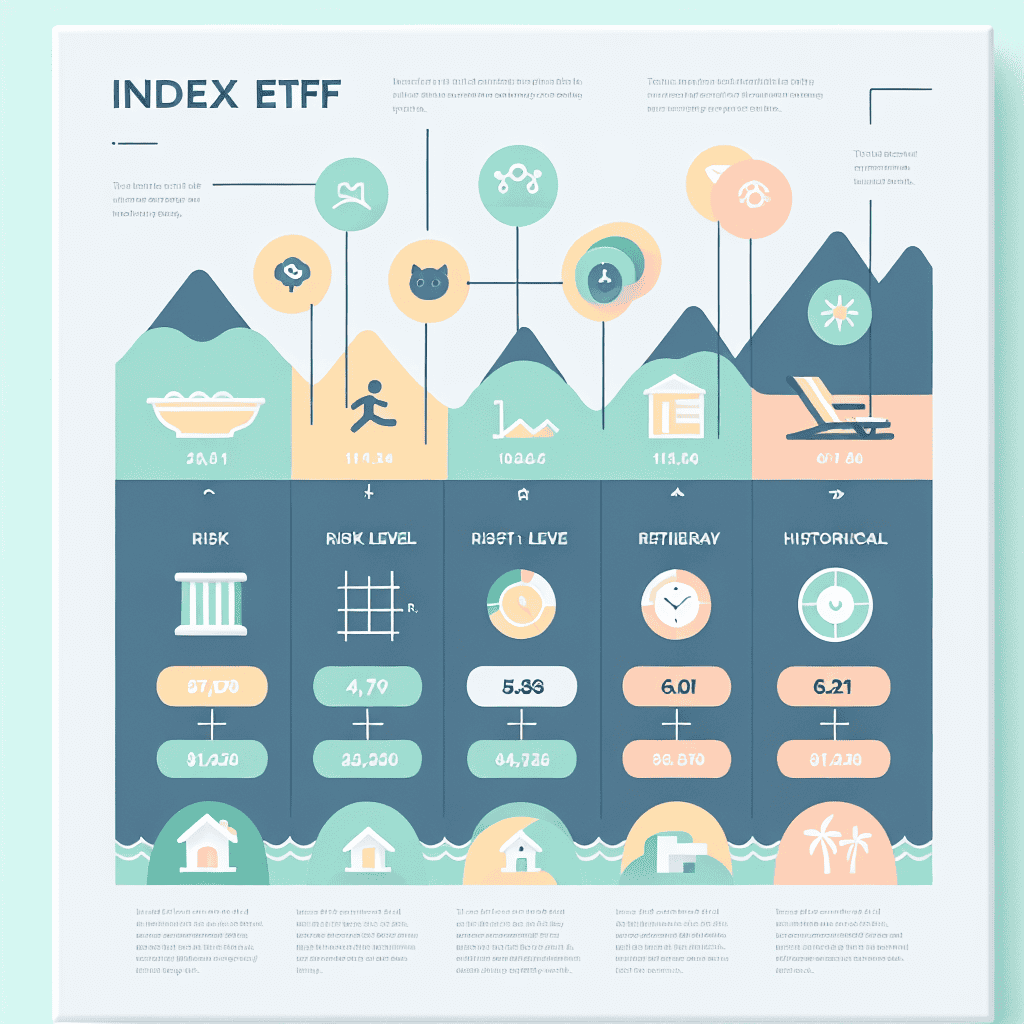“Secure Your Future: Top 8 Index ETFs Tailored for Retiree Peace of Mind”
Introduction
Investing for retirement requires a strategic approach that balances growth potential with risk management. Exchange-Traded Funds (ETFs) have become a popular choice for retirees due to their diversification, liquidity, and cost-effectiveness. Among the myriad of options available, certain index ETFs stand out as particularly well-suited for those in or nearing retirement. These top 8 index ETFs offer a blend of stability, income generation, and growth potential, making them ideal for retirees looking to preserve their capital while still participating in market gains. By focusing on broad market indices, these ETFs provide exposure to a wide range of sectors and geographies, reducing the risk associated with individual stock investments. Whether prioritizing dividend income, low volatility, or international diversification, these ETFs cater to the diverse needs of retirees seeking to secure their financial future.
Understanding Index ETFs: A Retiree’s Guide
Exchange-traded funds (ETFs) have become increasingly popular among retirees seeking to balance growth and income in their investment portfolios. These financial instruments offer a diversified approach to investing, often with lower fees than mutual funds, making them an attractive option for those in or nearing retirement. Understanding index ETFs is crucial for retirees aiming to maximize their financial security while minimizing risk. Index ETFs are designed to track specific market indices, providing investors with exposure to a broad range of assets. This diversification can help mitigate risk, a key consideration for retirees who may not have the time horizon to recover from significant market downturns.
One of the primary benefits of index ETFs is their cost-effectiveness. Typically, these funds have lower expense ratios compared to actively managed funds, as they simply aim to replicate the performance of a given index rather than outperform it. This cost efficiency can be particularly advantageous for retirees, who often need to stretch their savings over several decades. Moreover, the passive management style of index ETFs can lead to lower turnover rates, which in turn can result in reduced capital gains taxes—a significant consideration for those on a fixed income.
In addition to cost savings, index ETFs offer liquidity and flexibility, allowing retirees to easily buy and sell shares as needed. This feature is particularly beneficial for those who may require access to their funds for unexpected expenses or who wish to adjust their portfolios in response to changing market conditions. Furthermore, the transparency of index ETFs, which regularly disclose their holdings, provides retirees with a clear understanding of where their money is invested, fostering a sense of control and confidence in their financial planning.
Among the top index ETFs suitable for retirees, the Vanguard Total Stock Market ETF (VTI) stands out for its comprehensive exposure to the entire U.S. stock market. This ETF includes large-, mid-, and small-cap stocks, offering a broad spectrum of growth opportunities. Similarly, the SPDR S&P 500 ETF Trust (SPY) provides exposure to the 500 largest U.S. companies, making it a staple for those seeking stability and growth potential. For retirees interested in international diversification, the iShares MSCI EAFE ETF (EFA) offers access to developed markets outside of North America, including Europe, Australasia, and the Far East.
Additionally, the Vanguard Total Bond Market ETF (BND) is an excellent choice for retirees prioritizing income and capital preservation. This ETF provides exposure to a wide range of U.S. investment-grade bonds, balancing risk and return. For those seeking inflation protection, the iShares TIPS Bond ETF (TIP) invests in Treasury Inflation-Protected Securities, which can help safeguard purchasing power over time. The Schwab U.S. Dividend Equity ETF (SCHD) is another attractive option, focusing on high-quality U.S. companies with a history of consistent dividend payments, thus providing a steady income stream.
Moreover, the Invesco QQQ Trust (QQQ) offers exposure to the Nasdaq-100 Index, which includes some of the most innovative and growth-oriented companies in the technology sector. Finally, the iShares Core S&P Small-Cap ETF (IJR) provides access to smaller U.S. companies, which can offer higher growth potential, albeit with increased volatility. By carefully selecting a mix of these top index ETFs, retirees can create a well-rounded portfolio that aligns with their financial goals and risk tolerance, ensuring a more secure and prosperous retirement.
Benefits Of Investing In Index ETFs For Retirement
Investing in index ETFs can be a prudent strategy for retirees seeking to balance growth potential with risk management. Index ETFs, or exchange-traded funds, are investment funds that aim to replicate the performance of a specific index, such as the S&P 500 or the Dow Jones Industrial Average. These financial instruments offer several benefits that make them particularly appealing to retirees who are often focused on preserving capital while generating a steady income stream.
One of the primary advantages of index ETFs is their diversification. By investing in an index ETF, retirees gain exposure to a broad range of securities within a particular index. This diversification helps mitigate the risk associated with investing in individual stocks, as the performance of the ETF is not reliant on the success of a single company. Instead, it reflects the overall performance of the entire index. Consequently, this reduces the impact of volatility and provides a more stable investment option for those in their retirement years.
Moreover, index ETFs are known for their cost-effectiveness. They typically have lower expense ratios compared to actively managed funds. This is because index ETFs are passively managed, meaning they do not require the same level of research and analysis as actively managed funds. Lower fees can significantly enhance the net returns for retirees, allowing them to retain more of their investment income. Over time, these savings can compound, providing a substantial financial benefit.
In addition to cost savings, index ETFs offer liquidity and flexibility, which are crucial for retirees who may need to access their funds quickly. Unlike some other investment vehicles, ETFs are traded on major stock exchanges, allowing investors to buy and sell shares throughout the trading day at market prices. This liquidity ensures that retirees can easily adjust their portfolios in response to changing financial needs or market conditions.
Furthermore, index ETFs provide transparency, as they disclose their holdings on a daily basis. This transparency allows retirees to have a clear understanding of where their money is invested, enabling them to make informed decisions about their financial future. This level of insight is particularly valuable for retirees who wish to maintain control over their investments and ensure alignment with their financial goals.
Another significant benefit of index ETFs is their potential for long-term growth. Historically, stock market indices have shown an upward trend over extended periods, despite short-term fluctuations. By investing in index ETFs, retirees can participate in this growth potential, which can help combat inflation and increase their purchasing power over time. This is especially important for retirees who may face rising living costs during their retirement years.
Additionally, index ETFs offer tax efficiency, which can be advantageous for retirees looking to minimize their tax liabilities. Due to their structure, index ETFs typically generate fewer capital gains distributions compared to actively managed funds. This can result in lower tax obligations, allowing retirees to retain more of their investment returns.
In conclusion, index ETFs present a compelling investment option for retirees due to their diversification, cost-effectiveness, liquidity, transparency, growth potential, and tax efficiency. By incorporating index ETFs into their retirement portfolios, retirees can achieve a balanced approach that aligns with their financial objectives while mitigating risks. As with any investment decision, it is essential for retirees to conduct thorough research and consult with financial advisors to ensure that their investment choices align with their individual needs and circumstances.
Top 8 Index ETFs For A Secure Retirement Portfolio
As retirees seek to secure their financial future, the importance of a well-structured investment portfolio cannot be overstated. Among the various investment vehicles available, index exchange-traded funds (ETFs) have emerged as a popular choice due to their diversification, cost-effectiveness, and ease of management. For those in retirement, selecting the right index ETFs can provide a stable income stream while preserving capital. Here, we explore the top eight index ETFs that are particularly well-suited for a secure retirement portfolio.
To begin with, the Vanguard Total Stock Market ETF (VTI) offers broad exposure to the entire U.S. stock market, encompassing large-, mid-, and small-cap stocks. This ETF is ideal for retirees seeking growth potential while maintaining diversification across various sectors. Its low expense ratio further enhances its appeal, allowing investors to retain more of their returns.
Transitioning to international markets, the iShares MSCI ACWI ex U.S. ETF (ACWX) provides exposure to global equities outside the United States. This ETF is particularly beneficial for retirees looking to diversify their portfolios geographically, thereby reducing reliance on the U.S. market alone. By including both developed and emerging markets, ACWX offers a balanced approach to international investing.
For those prioritizing income, the Vanguard Dividend Appreciation ETF (VIG) focuses on companies with a history of increasing dividends. This ETF is an excellent choice for retirees seeking a steady income stream, as it invests in high-quality companies with strong fundamentals. The emphasis on dividend growth rather than high current yield ensures that the income stream is sustainable over the long term.
In addition to dividend-focused strategies, the iShares Core U.S. Aggregate Bond ETF (AGG) provides exposure to the U.S. investment-grade bond market. Bonds are a crucial component of a retirement portfolio, offering stability and income. AGG includes a mix of government, corporate, and mortgage-backed securities, making it a comprehensive choice for fixed-income investors.
Moreover, the SPDR S&P 500 ETF Trust (SPY) remains a staple for many investors, including retirees. By tracking the S&P 500 Index, SPY offers exposure to 500 of the largest U.S. companies, providing a solid foundation for any portfolio. Its long track record and liquidity make it a reliable option for those seeking growth and stability.
For retirees interested in inflation protection, the Schwab U.S. TIPS ETF (SCHP) invests in Treasury Inflation-Protected Securities. These bonds adjust their principal value based on changes in the Consumer Price Index, offering a hedge against inflation. As inflation erodes purchasing power, SCHP can help preserve the real value of a retiree’s income.
Additionally, the Invesco QQQ Trust (QQQ) provides exposure to the Nasdaq-100 Index, which includes 100 of the largest non-financial companies listed on the Nasdaq Stock Market. This ETF is suitable for retirees with a higher risk tolerance, as it focuses on technology and growth-oriented sectors, offering the potential for significant capital appreciation.
Finally, the iShares U.S. Real Estate ETF (IYR) offers exposure to the real estate sector, which can provide both income and diversification benefits. Real estate investments often generate steady cash flows through dividends, making IYR an attractive option for retirees seeking income and a hedge against market volatility.
In conclusion, these eight index ETFs offer a range of options for retirees looking to build a secure and diversified portfolio. By carefully selecting ETFs that align with their financial goals and risk tolerance, retirees can enjoy a stable income stream and peace of mind in their golden years.
How To Choose The Right Index ETF For Your Retirement

When planning for retirement, selecting the right investment vehicles is crucial to ensure financial stability and growth. Among the various options available, index exchange-traded funds (ETFs) have gained popularity due to their diversified nature, cost-effectiveness, and potential for steady returns. For retirees, choosing the right index ETF involves considering several factors that align with their financial goals and risk tolerance. Understanding these factors can help retirees make informed decisions that support their long-term financial well-being.
To begin with, retirees should assess their risk tolerance, which is a critical component in selecting an appropriate index ETF. Generally, retirees may prefer lower-risk investments to preserve their capital while still achieving modest growth. Therefore, it is advisable to consider ETFs that track broad market indices, such as the S&P 500 or the Dow Jones Industrial Average, as these tend to offer a balanced mix of stability and growth potential. These indices represent a wide array of industries and sectors, providing diversification that can mitigate risk.
In addition to risk tolerance, retirees should evaluate the expense ratios of potential ETFs. Since index ETFs are passively managed, they typically have lower expense ratios compared to actively managed funds. However, even small differences in expense ratios can significantly impact long-term returns. Retirees should aim to select ETFs with low expense ratios to maximize their investment returns over time. This cost-efficiency is particularly important for retirees who rely on their investment income to support their lifestyle.
Moreover, retirees should consider the dividend yield of the index ETFs they are evaluating. Many retirees seek income-generating investments to supplement their retirement income. ETFs that track indices with a history of strong dividend-paying companies can provide a reliable income stream. For instance, ETFs that focus on high-dividend yield indices or dividend aristocrats, which are companies with a long track record of increasing dividends, can be attractive options for retirees seeking regular income.
Another important consideration is the tax efficiency of the ETF. Retirees should be mindful of the tax implications of their investments, as taxes can erode returns. Index ETFs are generally more tax-efficient than mutual funds due to their structure and the way they are traded. However, it is still essential to understand the specific tax treatment of dividends and capital gains associated with the ETF. Consulting with a tax advisor can provide retirees with insights into how different ETFs may impact their tax situation.
Furthermore, retirees should evaluate the liquidity of the ETF. Liquidity refers to how easily an ETF can be bought or sold in the market without affecting its price. Highly liquid ETFs are preferable as they offer flexibility in managing investments, especially during market fluctuations. ETFs that track major indices tend to have higher liquidity due to their popularity and large trading volumes.
Lastly, retirees should consider the historical performance and reputation of the ETF provider. While past performance is not indicative of future results, it can provide insights into how the ETF has weathered different market conditions. Additionally, choosing ETFs from reputable providers with a strong track record can offer retirees peace of mind regarding the management and oversight of their investments.
In conclusion, selecting the right index ETF for retirement involves a careful evaluation of risk tolerance, expense ratios, dividend yield, tax efficiency, liquidity, and the provider’s reputation. By considering these factors, retirees can make informed decisions that align with their financial goals and help secure a stable and prosperous retirement.
Diversifying Your Retirement Portfolio With Index ETFs
Diversifying your retirement portfolio is a crucial step in ensuring financial stability and peace of mind during your golden years. One effective way to achieve this diversification is through the use of index exchange-traded funds (ETFs). These investment vehicles offer a cost-effective and efficient means of gaining exposure to a broad range of asset classes, thereby reducing risk and enhancing potential returns. For retirees, who often prioritize income stability and capital preservation, index ETFs can be particularly appealing. In this context, we will explore the top eight index ETFs that are well-suited for retirees, providing a balanced mix of growth and income potential.
To begin with, the Vanguard Total Stock Market ETF (VTI) is an excellent choice for retirees seeking broad exposure to the U.S. equity market. This ETF tracks the performance of the CRSP US Total Market Index, encompassing large-, mid-, small-, and micro-cap stocks. Its low expense ratio and comprehensive market coverage make it a cornerstone for any diversified portfolio. Transitioning from domestic to international markets, the iShares MSCI ACWI ex U.S. ETF (ACWX) offers retirees exposure to global equities outside the United States. By investing in this ETF, retirees can benefit from the growth potential of developed and emerging markets, thereby enhancing their portfolio’s diversification.
In addition to equities, fixed-income investments are essential for retirees aiming to generate steady income. The iShares Core U.S. Aggregate Bond ETF (AGG) is a popular choice, as it provides exposure to a wide range of U.S. investment-grade bonds, including government, corporate, and mortgage-backed securities. This ETF is designed to track the Bloomberg Barclays U.S. Aggregate Bond Index, offering a reliable source of income with relatively low risk. Complementing AGG, the Vanguard Total International Bond ETF (BNDX) allows retirees to diversify their fixed-income holdings globally. By investing in international government and corporate bonds, this ETF provides an additional layer of diversification and potential for higher yields.
For those retirees interested in dividend income, the Schwab U.S. Dividend Equity ETF (SCHD) is worth considering. This ETF focuses on high-quality U.S. companies with a strong track record of paying dividends, making it an attractive option for income-seeking investors. Similarly, the Vanguard Dividend Appreciation ETF (VIG) targets companies with a history of increasing dividends over time, offering both income and growth potential. These dividend-focused ETFs can serve as valuable components of a retirement portfolio, providing a steady income stream while also participating in the growth of the underlying companies.
Moreover, retirees looking to hedge against inflation may find the SPDR Gold Shares ETF (GLD) beneficial. As a physical gold-backed ETF, GLD offers a convenient way to invest in gold, which has historically served as a hedge against inflation and currency fluctuations. Including a small allocation to gold can help protect the purchasing power of a retirement portfolio over time.
Finally, the Invesco QQQ Trust (QQQ) provides exposure to the Nasdaq-100 Index, which includes 100 of the largest non-financial companies listed on the Nasdaq Stock Market. While this ETF is more growth-oriented, its focus on technology and innovation can offer retirees the potential for capital appreciation, balancing the more conservative elements of their portfolio.
In conclusion, these eight index ETFs offer retirees a well-rounded approach to portfolio diversification, combining growth, income, and risk management. By carefully selecting a mix of these ETFs, retirees can build a robust investment strategy that aligns with their financial goals and risk tolerance, ensuring a secure and prosperous retirement.
Risk Management In Retirement: The Role Of Index ETFs
As retirees navigate the complexities of managing their financial portfolios, the importance of risk management becomes increasingly evident. One effective strategy for achieving a balanced approach to risk and return is the incorporation of index exchange-traded funds (ETFs) into retirement portfolios. Index ETFs offer a diversified, cost-effective, and relatively low-risk investment option, making them particularly appealing to retirees seeking stability and growth. In this context, we explore the top eight index ETFs that are well-suited for retirees, emphasizing their role in risk management.
To begin with, the Vanguard Total Stock Market ETF (VTI) is a compelling choice for retirees. This ETF provides exposure to the entire U.S. stock market, encompassing large-, mid-, and small-cap stocks. By investing in VTI, retirees can benefit from broad market diversification, which helps mitigate the risk associated with individual stock volatility. Furthermore, VTI’s low expense ratio enhances its appeal, allowing retirees to maximize their returns over time.
Transitioning to international exposure, the iShares MSCI ACWI ex U.S. ETF (ACWX) offers retirees a gateway to global markets outside the United States. This ETF tracks the performance of the MSCI All Country World Index, excluding the U.S., and includes both developed and emerging markets. By diversifying geographically, retirees can reduce the risk associated with domestic market fluctuations and potentially capitalize on growth opportunities abroad.
In addition to equity exposure, fixed-income investments play a crucial role in retirement portfolios. The iShares Core U.S. Aggregate Bond ETF (AGG) is a cornerstone for retirees seeking stability and income. AGG tracks the Bloomberg Barclays U.S. Aggregate Bond Index, providing exposure to a wide range of investment-grade bonds. This ETF offers a reliable income stream while helping to cushion the portfolio against equity market volatility.
For those interested in inflation protection, the Schwab U.S. TIPS ETF (SCHP) is an excellent option. This ETF invests in Treasury Inflation-Protected Securities (TIPS), which are designed to protect against inflation by adjusting their principal value in response to changes in the Consumer Price Index. By including SCHP in their portfolios, retirees can safeguard their purchasing power in an inflationary environment.
Moreover, the SPDR S&P Dividend ETF (SDY) is ideal for retirees seeking income through dividends. This ETF focuses on companies with a history of consistently increasing dividends, providing a reliable income stream. The emphasis on dividend growth also suggests a level of financial stability, which can be reassuring for retirees prioritizing income security.
Additionally, the Invesco QQQ ETF (QQQ) offers exposure to the technology sector, which has been a significant driver of market growth. While technology stocks can be more volatile, QQQ’s focus on the Nasdaq-100 Index provides access to established, high-performing companies. Retirees with a higher risk tolerance may find QQQ an attractive option for potential capital appreciation.
Furthermore, the iShares Russell 2000 ETF (IWM) provides exposure to small-cap stocks, which can offer higher growth potential. While small-cap stocks are generally more volatile, IWM’s broad diversification within the Russell 2000 Index helps mitigate individual stock risk. Retirees seeking growth opportunities may consider a modest allocation to IWM.
Finally, the SPDR Gold Shares ETF (GLD) serves as a hedge against market uncertainty and currency fluctuations. Gold has historically been a safe-haven asset, and including GLD in a retirement portfolio can provide an additional layer of risk management.
In conclusion, these top eight index ETFs offer retirees a well-rounded approach to risk management, balancing growth potential with income stability and inflation protection. By carefully selecting and diversifying among these ETFs, retirees can construct a resilient portfolio that aligns with their financial goals and risk tolerance.
Comparing Index ETFs: Finding The Best Fit For Retirees
When it comes to planning for retirement, ensuring a stable and reliable income stream is paramount. For many retirees, investing in index exchange-traded funds (ETFs) offers a balanced approach to achieving this goal. Index ETFs provide diversification, lower costs, and the potential for steady returns, making them an attractive option for those looking to preserve and grow their retirement savings. In this context, selecting the right index ETFs becomes crucial. Here, we explore the top eight index ETFs that are particularly well-suited for retirees, considering factors such as risk tolerance, income needs, and long-term growth potential.
To begin with, the Vanguard Total Stock Market ETF (VTI) is a popular choice among retirees due to its broad exposure to the entire U.S. stock market. This ETF includes large-, mid-, and small-cap stocks, offering a comprehensive representation of the market. Its low expense ratio and historical performance make it an appealing option for those seeking growth while maintaining a diversified portfolio. Transitioning to a more income-focused approach, the Schwab U.S. Dividend Equity ETF (SCHD) is another excellent choice. This ETF targets high-dividend-yielding U.S. stocks, providing retirees with a steady income stream. Its focus on quality companies with strong dividend histories ensures a level of stability that is often sought after in retirement.
For retirees interested in international diversification, the iShares MSCI EAFE ETF (EFA) offers exposure to developed markets outside of North America. This ETF includes stocks from Europe, Australasia, and the Far East, providing a geographical balance that can mitigate risks associated with domestic market fluctuations. Similarly, the Vanguard FTSE Emerging Markets ETF (VWO) allows retirees to tap into the growth potential of emerging markets. While this ETF carries a higher risk due to the volatility of emerging economies, it can be a valuable component of a diversified portfolio for those willing to embrace a bit more risk for potentially higher returns.
In addition to these options, the iShares Core U.S. Aggregate Bond ETF (AGG) is an essential consideration for retirees prioritizing income and capital preservation. This ETF provides exposure to a wide range of U.S. investment-grade bonds, including government, corporate, and mortgage-backed securities. Its focus on fixed income makes it a cornerstone for those seeking stability and regular income. Complementing this, the Vanguard Real Estate ETF (VNQ) offers exposure to the real estate sector, which can provide both income and growth. Real estate investment trusts (REITs) included in this ETF often pay higher dividends, making it an attractive option for income-focused retirees.
Moreover, the SPDR S&P 500 ETF Trust (SPY) remains a classic choice for those looking to invest in the largest U.S. companies. Its long-standing track record and liquidity make it a reliable option for retirees seeking growth with moderate risk. Finally, the Invesco QQQ Trust (QQQ) offers exposure to the Nasdaq-100 Index, focusing on technology and innovation-driven companies. While it carries higher volatility, its potential for significant growth can be appealing for retirees with a higher risk tolerance.
In conclusion, selecting the right index ETFs for retirement involves balancing risk, income, and growth potential. By considering options like VTI, SCHD, EFA, VWO, AGG, VNQ, SPY, and QQQ, retirees can tailor their investment strategy to align with their financial goals and risk preferences. Each of these ETFs offers unique benefits, and when combined thoughtfully, they can form a robust portfolio that supports a comfortable and secure retirement.
Q&A
1. **What is an Index ETF?**
An Index ETF is an exchange-traded fund designed to track the performance of a specific index, such as the S&P 500 or the Dow Jones Industrial Average.
2. **Why are Index ETFs suitable for retirees?**
Index ETFs are suitable for retirees because they offer diversification, typically have lower fees than actively managed funds, and provide exposure to a broad market segment, which can help manage risk.
3. **What is the Vanguard S&P 500 ETF (VOO)?**
The Vanguard S&P 500 ETF (VOO) is an ETF that aims to replicate the performance of the S&P 500 Index, providing exposure to 500 of the largest U.S. companies.
4. **What is the iShares Core MSCI Total International Stock ETF (IXUS)?**
The iShares Core MSCI Total International Stock ETF (IXUS) offers exposure to a broad range of international stocks, excluding the U.S., making it a good option for retirees seeking global diversification.
5. **What is the Schwab U.S. Dividend Equity ETF (SCHD)?**
The Schwab U.S. Dividend Equity ETF (SCHD) focuses on high-dividend-yielding U.S. stocks, appealing to retirees looking for income through dividends.
6. **What is the SPDR Portfolio S&P 500 High Dividend ETF (SPYD)?**
The SPDR Portfolio S&P 500 High Dividend ETF (SPYD) targets high-dividend-yielding stocks within the S&P 500, providing retirees with potential income and growth.
7. **What is the Invesco QQQ Trust (QQQ)?**
The Invesco QQQ Trust (QQQ) tracks the Nasdaq-100 Index, offering exposure to 100 of the largest non-financial companies listed on the Nasdaq Stock Market, suitable for retirees interested in technology and growth sectors.
8. **What is the iShares Russell 2000 ETF (IWM)?**
The iShares Russell 2000 ETF (IWM) provides exposure to small-cap U.S. stocks, which can be a good option for retirees looking to diversify their portfolio with smaller, potentially high-growth companies.
Conclusion
The top 8 index ETFs perfect for retirees typically focus on providing a balance of income, growth, and stability, which are crucial for retirement portfolios. These ETFs often include a mix of dividend-paying stocks, bonds, and other assets to ensure steady income and risk management. They are designed to offer diversification, low fees, and tax efficiency, making them suitable for long-term investment horizons. Retirees should consider factors such as expense ratios, yield, historical performance, and asset allocation when selecting these ETFs to align with their financial goals and risk tolerance. Ultimately, these ETFs can serve as a foundational component of a retirement strategy, helping to preserve capital while generating income.





